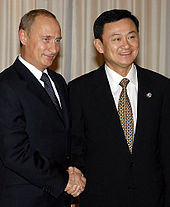Premiership of Thaksin Shinawatra
As prime minister, Thaksin Shinawatra initiated many policies affecting the economy, public health, education, energy, drugs and international relations.
His government has been frequently charged with dictatorship, demagogy, corruption, conflicts of interest, human rights offences, acting undiplomatically, using legal loopholes, and hostility towards a free press.
Economists from the Thailand Development Research Institute argue that other factors, such as a revival in export demand, were the primary causes behind the economy's recovery.
[16] The Thaksin government reduced the state's control of the media by privatizing MCOT, a large television and radio broadcaster.
The financial losses caused by the program led some hospitals to seek alternative sources of income, leading to a boom in the medical tourism industry, with 1.3 million foreign patients earning Thailand 33 billion THB (approx.
[21][22] Post-coup Public Health Minister Mongkol Na Songkhla called the 30-baht program a "marketing gimmick" and claimed that the government would stop charging any fees for visits to state hospitals.
[25] Thaksin allowed an estimated 2.3 million foreign workers in Thailand to register and seek health coverage under the Thai national healthcare system.
Democrat Party Labour Group Committee Pongsak Plengsaeng criticized the move, claiming that it would lead to unemployment amongst Thais.
Thaksin requested that the UN Commission on Human Rights send a special envoy to evaluate the situation, but said in an interview, "The United Nations is not my father.
"The special committee will be tasked with an investigation to find out the truth about the deaths as well as to identify remedial measures for their relatives", said Justice Minister Charnchai Likhitjittha.
However, while giving the opinion that orders to kill came from the top, the panel failed to establish sufficient evidence to charge Thaksin directly with the murders.
At a brainstorming session, a representative from the Office of Narcotics Control Board (ONCB) Tuesday disclosed that as many as 1,400 people were killed and labeled as drug suspects despite the fact that they had no link to drugs .... Senior public prosecutor Kunlapon Ponlawan said it was not difficult to investigate extra-judicial killings carried out by police officers as the trigger-pullers usually confessed.
[50] The policy was designed to delegated school management from the over-centralized and bureaucratized Ministry of Education to Tambon Administrative Organizations (TAOs).
Thaksin made Thailand one of the first supporters of Nicholas Negroponte's One Laptop Per Child (OLPC) project, with the Thai Ministry of Education committing to purchase 600,000 units.
Whereas the Chuan government's post-Asian financial crisis policies sought economic efficiency through industry fragmentation and wholesale power pool competition,[57] Thaksin's policies aimed to create national champions that could reliably support stronger economic growth and become important players in regional energy markets.
Thaksin has been widely criticized for his management of the situation, in particular the storming of the Krue Se Mosque, the deaths of civilian protesters at Tak Bai in army custody, and the unsolved kidnapping of Muslim-lawyer Somchai Neelapaijit.
[62] In March 2005, Thaksin established the National Reconciliation Commission, chaired by former Prime Minister Anand Panyarachun to oversee efforts to bring peace to the troubled south.
In its final report released in June 2006, the commission proposed introducing Islamic law and making Pattani-Malay (Yawi) an official language in the region.
It was hailed as a "historic breakthrough" and "the first major reorganization of ministries since King Chulalongkorn set up Thailand's modern system of departmental government in 1897."
Such a restructuring had been studied for years as a means of undermining the perceived rigidities and inertia of the old system, but was never implemented until the Thaksin government.
New ministries were carved out in Social and Human Security Development, Tourism and Sports, Natural Resources and Environment, Information and Communication Technology, and Culture.
Thaksin transformed the role of provincial governors from ceremonial supervisors of ministry officials to active managers of government policy.
Historically, central government ministries operated in the provinces through field offices headed by senior officials, who reported back to Bangkok.
Surapong Jayanama, former ambassador to Vietnam claiming that Thaksin's policies were "demeaning" and would do little to enhance Thailand's international stature.
Thaksin announced that Thailand would forsake foreign aid, and work with donor countries to assist in the development of neighbors in the Greater Mekong Sub-region.
[69] Thaksin established close, friendly ties with the Burmese dictatorship, including extending the neighboring country a four billion baht credit line so it could conclude a satellite telecom deal with his family business.
Thaksin has been attacked for his support of former Deputy Prime Minister Surakiart Sathirathai's failed campaign to become UN Secretary General.
There have also been complaints that Thaksin-appointed relatives to senior positions in the civil service and independent commissions, for example by elevating his cousin, General Chaiyasit Shinawatra, to Army commander-in-chief.
[76][77] Thaksin was also accused of interference after the Senate appointed Wisut Montriwat (former Deputy Permanent Secretary of the Ministry of Finance) to the position of Auditor General, replacing Jaruvan Maintaka.
[80][81][82] Thaksin has been engaged in a series of lawsuits brought by American businessman William L Monson regarding a cable-television joint venture the two partnered in during the 1980s.


